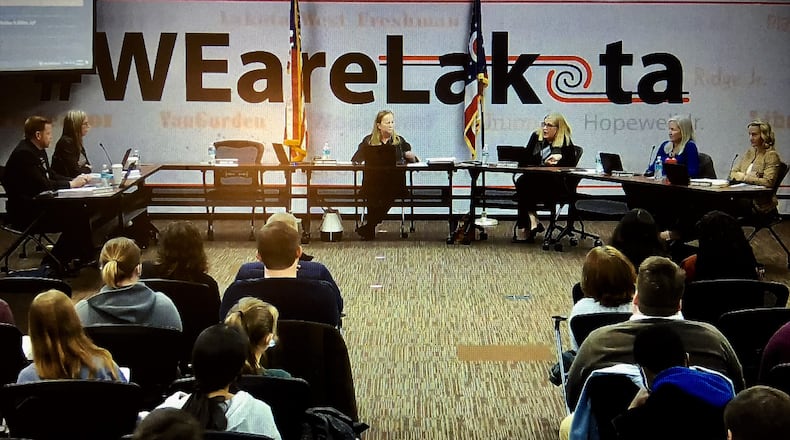The Lakota survey, which was conducted by a contracted opinion research company, included the questioning of 400 randomly selected adult residents of the 17,000-student district, which encompasses West Chester and Liberty townships.
Among the survey respondents — who answered the question of whether the Lakota district “is generally going in the right direction or has it gotten off onto the wrong track? — 55% said “right direction” while 24% said “wrong track” with 19% unsure and 2% mixed responses.
When asked how much the education provided by Lakota “has contributed to the quality of life that is enjoyed by people who live in the community?” 43% replied “a lot” and 42% answered “somewhat.”
The remaining respondents broke down into 7% replying “not much” with 2% answering “not at all” and 7% unsure.
And 54% of those surveyed rated the district as either doing an “excellent” job (15%) at managing its budget and tax dollars with 39% saying the district does a “good” job. Of respondents, 23% said Lakota does a fair job while 7% said poor or very poor, with 16% uncertain.
Board members and Lakota Superintendent Matt Miller welcomed the survey results but noted there remains areas needing improvement and that the district will concentrate on those.
School Board President Lynda O’Connor began the meeting with a statement urging the board to also concentrate on improving the civility of its discussions.
O’Connor cited — though not by name — an allegation by Boddy at the last meeting where she implied the district administration should not be trusted with the task of determining whether Critical Race Theory (CRT) exists in some of Lakota’s curricula.
“At the last board meeting there were comments that were expressed in the heat of discussion that were viewed as derogatory toward the superintendent. And I wanted to take this opportunity to express my support for Matt and his work as superintendent,” said O’Connor.
Board discussions are at times “passionate” with “spirited debates,” she said.
“But derogatory statements and personal attacks directed at our administration or other board members are not productive. I strongly encourage my fellow board members to join me in holding ourselves to a standard of mutual respect.”
O’Connor invited board members to respond to her statement and Kelly Casper, Julie Shaffer and Isaac Adi expressed support for her statement.
Boddy, however, said “it is my responsibility to ask questions and I will continue to do so. And I will do my job to the best of my ability.”
Lakota officials have maintained for months CRT is not being taught in its schools.
At the board’s recent directive, district administrators are reviewing firms to have its curricula audited for possible CRT class lessons.
But Lakota Spokeswoman Betsy Fuller told the Journal-News Tuesday there is also a curricula audit already in process.
“The curriculum audit has nothing to do with CRT and has been in place since September. The audit is focused on (grades) 7-12 math and English curriculum to ensure that it aligns with new state standards.”
“The audit is focused on the alignment of our curriculum with the state’s standards,” she said, also noting Social Emotional Learning or SEL instruction is listed at the Ohio Department of Education’s website among its standards.
“I am not sure what CRT audit you are referring to,” said Fuller, who added the Journal-News’ reference to a CRT audit “is a bit misleading.”
“Social Emotional Learning (SEL) is part of the state standards and is not CRT,” she said.
But local and national critics of SEL lessons often contend that type of classroom instruction is a similar or a renamed version of CRT.
Moreover, some critics contend both CRT and SEL lessons are focused through an “equity” perspective that teaches children in variety of curricula - including at times English lessons - that America was founded on racist oppressor principles and they further claim classroom SEL instruction is not politically or ideologically neutral.
Boddy — and to a lesser degree her fellow, newly elected running mate Adi — have actively argued against CRT — and any of its other named variations of classroom lessons — saying it is inappropriate to be taught in Lakota or other public schools.
Boddy twice tried to introduce a motion against CRT and twice none of the other four members agreed to second her motion for continued discussion.
During board member’s closing comments section at the end of the meeting, Boddy said “Critical Race Theory is a toxic philosophy that is poisoning and destroying the minds and souls of our children.”
“The parents who see CRT in the district take it very seriously and so should we.”
Boddy also said the Lakota district administrators have a “conflict of interest” in determining whether CRT is taught in the district.
The school board should “remove the administration from this (CRT audit) process and that they should remain as uninvolved as possible … including the hiring of any third party that would be looking into it.”
About the Author

